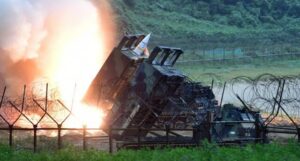The decision by Joe Biden to allow Ukraine to use Western long-range missiles for strikes inside Russian territory marks a fairly significant policy shift by Washington.
However, this development is bound to provoke strong resentment and new threats from Moscow at a time of intense uncertainty as Donald Trump prepares to take over the US presidency.
According to Sky News, Putin had warned that if Western powers allowed their ballistic and cruise missiles to be used against Russia it would be like “playing with fire”, even risking global conflict. US and UK officials have been avoiding being drawn into Moscow’s aggressive rhetoric over the past year, whose aim is mainly intimidation. Nonetheless, there has so far been reluctance, mainly on the part of Washington, to allow Kiev to use long-range missiles, known as Army Tactical Missile Systems or ATACMS, for strikes outside its borders.
“Change of plan” due to North Korea
Biden’s decision comes after reports of thousands of North Korean soldiers being sent to fight alongside Russia. According to the New York Times, the first targets of US missiles on Russian soil are likely to be Russian and North Korean troops fighting in the Kursk region.
However, as Sky News points out, although the use of US missiles to strike Russian territory signals a strengthening of Western support, analysts believe that this move alone will not dramatically change the course of the war. It will, however, enable Ukraine to strike critical military targets that Moscow has deliberately placed far from the front line, such as missile depots and drones used against Kiev.
Political messages and possible responses
Beyond the military aspect, as Sky News points out, the US decision sends a strong political message to the Kremlin: that Washington is determined to defy Russian warnings of dire consequences and support Kiev.
The move comes after months of intense pressure from the Ukrainian president, Volodymyr Zelensky, to step up military support. The crucial question now is how Vladimir Putin will react when a U.S. missile causes the death of Russian soldiers in his own country.
Moscow does not want direct conflict with the United States and NATO – powers with a nuclear arsenal and combined greater military power. However, the Kremlin could further escalate its campaign of sabotage and other forms of hybrid warfare across Europe.
A second important question concerns what stance Donald Trump, who has pledged to end the war quickly, will take. Despite his unclear strategy, the Republican has expressed strong opposition to the continued provision of US arms to Ukraine. Perhaps this will motivate Kiev to take advantage of the current support from Washington as quickly as possible.
Ask me anything
Explore related questions





